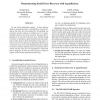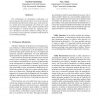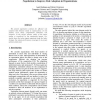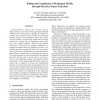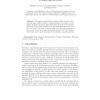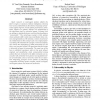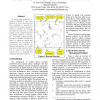ATAL
2004
Springer
15 years 6 months ago
2004
Springer
In real world applications, agents - be they software agents or autonomous robots - inevitably face erroneous situations that have not been planned for. Re-planning can sometimes ...
ATAL
2004
Springer
15 years 6 months ago
2004
Springer
We consider the problem of finding a commonly agreed upon diagnosis for errors observed in a system monitored by a number of different expert agents. Each agent is assumed to hav...
80
Voted
ATAL
2004
Springer
15 years 6 months ago
2004
Springer
The development of autonomous multi-agent systems acting upon the interests of one or more users involves the elicitation of preferences of these users. In decision theory, models...
94
Voted
ATAL
2004
Springer
15 years 6 months ago
2004
Springer
The ability to generate narrative is of importance to computer systems that wish to use story effectively for entertainment, training, or education. We identify two properties of ...
ATAL
2004
Springer
15 years 6 months ago
2004
Springer
We present negotiation schemes for efficient role adoption that enhance utility in organizations. In one scheme, local utility computations determine role adoption. In the second ...
89
Voted
ATAL
2004
Springer
15 years 6 months ago
2004
Springer
Decision-theoretic models have become increasingly popular as a basis for solving agent and multiagent problems, due to their ability to quantify the complex uncertainty and prefe...
ATAL
2004
Springer
15 years 6 months ago
2004
Springer
Abstract. We present an analysis Trust Analysis Methodology for finding trust issues within pervasive computing systems. It is based on a systematic analysis of scenarios that des...
106
Voted
ATAL
2004
Springer
15 years 6 months ago
2004
Springer
Much research in multi-agent systems reflects the field’s origins in classical artificial intelligence, showing how various refinements to the internal reasoning of individual a...
131
Voted
ATAL
2004
Springer
15 years 6 months ago
2004
Springer
Abstract. In recent years, mobile ad-hoc networks (MANET’s) have been deployed in various scenarios, but their scalability is severely restricted by the human operators’ abilit...
132
Voted
ATAL
2004
Springer
15 years 6 months ago
2004
Springer
In recent years, mobile ad-hoc networks (MANET’s) have been deployed in various scenarios, but their scalability is severely restricted by the human operators’ ability to conf...
